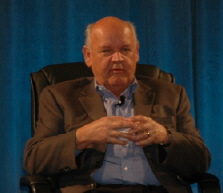The future of WiMax

The Future in Review panel entitled "The Future of WiMax" began with Nicolas Kauser, President, Clearwire saying that the wireless technology is overhyped and overpromised. The WiMax protocol 802.16d is used more for promotional purposes, according to Kauser, the pioneering CTO at McCaw Cellular (which became AT&T Wireless). But the implementations among vendors aren’t compatible. "There are so many options, and I don’t expect companies to give up what they consider their advantage," Kauser said. In addition, 802.16d it doesn’t satisfy the needs of more mobile users. The "real" WiMax is 802.16e, which is fully mobile, Kauser said. Intel, which is an investor in Clearwire and also working with Sprint and other carriers on WiMax , has a chip for d and could have an e chip by mid-2007.

Simon Hackett, founder and CEO, Agile Communications, an Australian broadband service provider noted that WiMax, compared to Wi-Fi, uses licensed spectrum, which can deliver carrier-grade quality of service. “Licensing on a city-by-city and country-by-country basis can be a huge battle,” Hackett said. He noted that the large telcos and cable companies have the edge in acquiring the spectrum. Clearwire has been acquiring spectrum and has service in cities in the U.S., such as Abilene, TX and Daytona Beach, FL, and will be up and running in four European countries soon, Kauser said. The company is also using unlicensed spectrum for backhaul redundancy but has run into obstacles in some areas. In Abilene, car dealers were using the spectrum that Clearwire wanted.
According to Strategy Analytics, the market for WiMAX subscriber terminals and base stations will reach more than 20 million per year in 2009, providing low-cost last mile connections. That's not a huge number, but who knows what will transpire in the next four years...